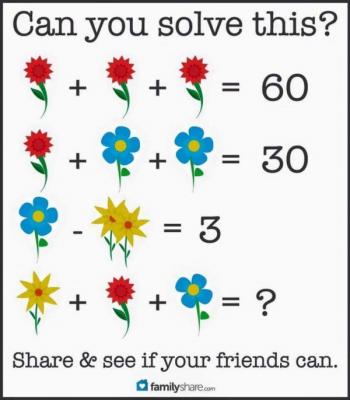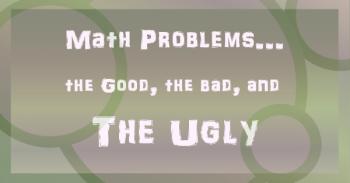Ask Professor Puzzler
Do you have a question you would like to ask Professor Puzzler? Click here to ask your question!
DailyMail.co.uk, and the various click-bait sites that copy their content, seem to be a bit confused on the difference between "hard" and "unsolvable." They recently discovered the "flower problem" (which everyone else was talking about four months ago), then they found our explanation of the problem, and posted a fine click-bait article headlined something along the lines of "Problem is so hard even a math teacher can't solve it."

There is a huge difference between something being "hard" and something being "unsolvable."
Let me give you an example:
John can mow lawns at a rate of 1 lawn every three hours. Jane can mow lawns at a rate of 2 lawns every five hours. If John and Jane work together, how many brick walls can they build in ten hours?
This is not a hard problem. It's actually very, very easy. It's very easy to recognize that the answer is "not enough information given." Information about rates mowing lawns doesn't tell us a blessed thing about their wall-building rates.
"Hard" implies that someone will actually spend a lot of time wrestling with the problem. But, in fact, you didn't spend any time at all on that, right? You knew immediately and instinctively that there wasn't enough information to solve it. That wasn't hard.
Here's another problem:
If x + y = 30, find the value of 2x - 3y.
Now this one is a little harder, because it might not be immediately apparent that there isn't enough information to solve the problem. Any first or second year Algebra student, however, shouldn't spend much time on that before they say, "Hey, wait a minute! There are two variables there, and only one linear equation, so I can't find x and y!"
Of course, a problem can be both hard and unsolvable. I used to get (on a regular basis) emails from people all over the world who were convinced that they had found a method of trisecting angles with a compass and straight edge. They spent hours and hours on their solutions - it was hard. And, sadly, despite all their hard work, they were wrong; the correct answer is, "It can't be done." And it has been proven. And the proof wasn't an easy one.
But...the flower problem is not hard.* It's very easy to see why the problem is not possible to solve. If you think you've found a numerical solution, make sure you think through exactly what assumptions you've made about the flowers and their petals (and their stems and leaves, because yes, you've probably made assumptions about those, too!), and then go read our blog post.
Thanks for visiting our site, and make sure you try out our educational games while you're here!
* Having said that the problem is not hard, I have to admit that it's excruciatingly painful to look at the comment sections on sites like DailyMail and realize that even setting aside the fact that you can't solve the problem without making assumptions, most people posting their "answers" don't even know elementary level mathematics and order of operations, and that there are almost as many answers given as there are comments made. So maybe the problem is harder than I thought.
And maybe DailyMail should have titled their article "So hard people think it can be solved." :D
For those who are interested in seeing more "bad math problems" on our blog, click the image below.



